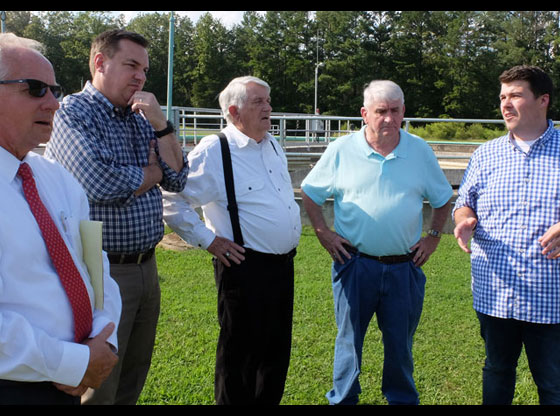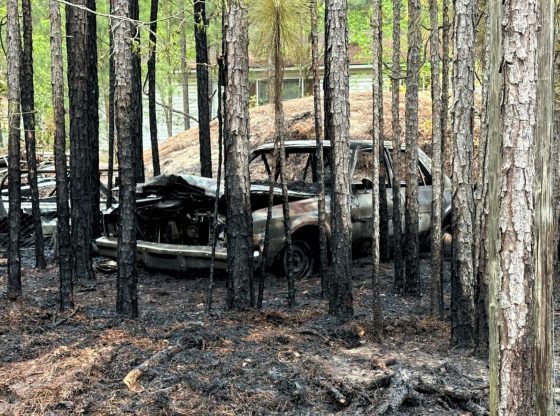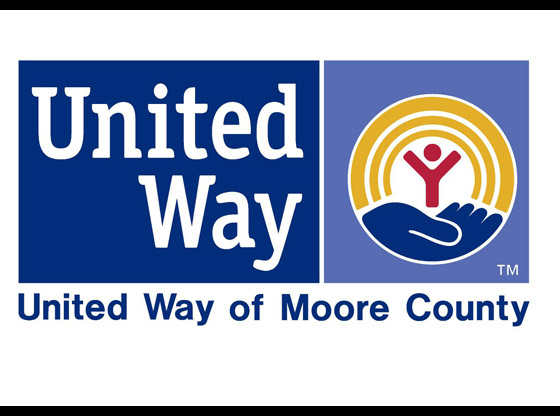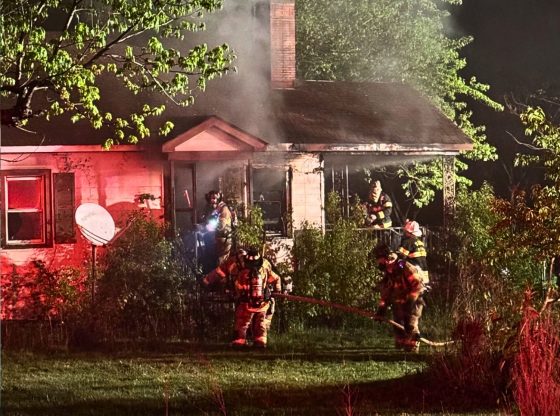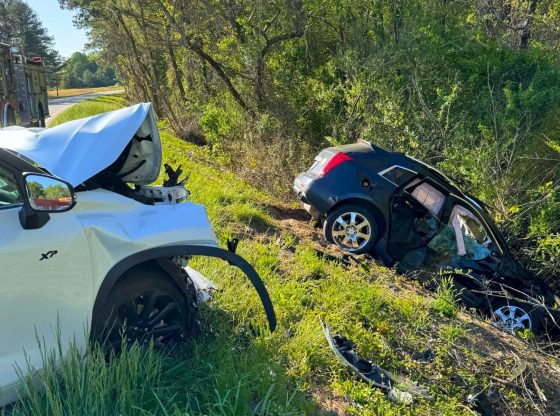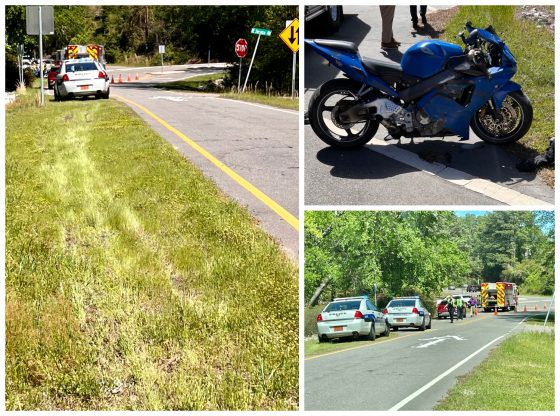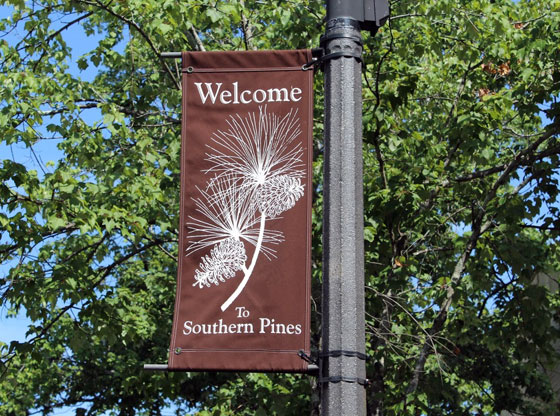Robbins remains in a delicate situation since Hurricane Florence. In addition to the significant damage that has been reported on the waste water treatment plant and pumping station, totaling over 1.6 million dollars, there was significant damage to infrastructure along the Bear Creek Trails, including a culvert and a roadway. Moderate damage was discovered at the Millikan Park. Total damage is estimated at just under 2.5 million dollars. The Town is procuring an engineer to obtain more detailed cost estimates.
After insurance adjusters from the League of Municipalities visited the damaged facilities in Robbins, the Town learned that the majority of the damage is excluded from coverage due to many of the facilities being in flood zones.
Minor damage at the wastewater treatment plant and the Millikan Park will be eligible for some insurance relief. The bulk of the repairs, however, will be potentially reimbursed through the Federal Emergency Management Program (FEMA).
“While we are grateful for departments like FEMA, the timelines and bureaucratic requirements make the process of recovery very difficult,” said David Lambert, Town Manager. “The Town will need to follow the “most restrictive” federal procurement methods in order to be reimbursed for their recovery efforts. Lambert explains, “The contracting certifications, agreements, and contract terms further complicate procurement and effectively discourages many local contractors from applying for the work.”
The financial impact of Hurricane Florence is substantial and will impact the fiscal needs of Robbins for many years to come. While employees are meticulously documenting recovery efforts and expenditures, there is no guarantee when the Town might receive a check to reimburse for the Town’s recovery efforts. North Carolina’s funds from Hurricane Matthew last year have yet to be substantially drawn down.
The Town has completed reimbursement paperwork for emergency protective measures totaling over $75,000—and that doesn’t include the repair of any facilities.
Lambert said, “This figure only reflects some of the expenses the Town has had for our emergency response and immediate clean-up efforts—they do not capture every expenditure.” The Town’s operational costs increases through the maintenance of temporary fixes, which generally cost more than normal operations.
The most significant temporary fix is at the Town’s Main Wastewater Pump Station. Robbins is currently renting a bypass pump from Moore County to keep waste water operations going. The pump takes waste water from the sewer and forces it to the treatment facility.
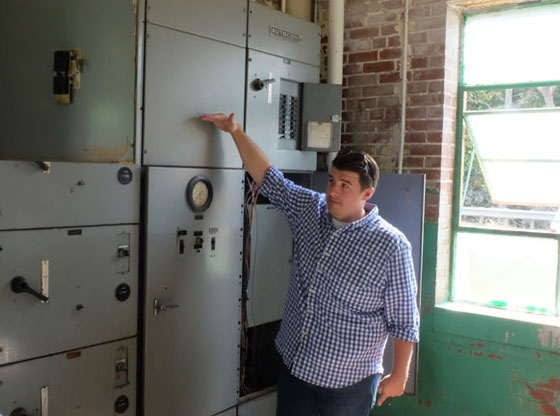
Robbins Town Manager David Lambert shows the height of flood water inside the pumping station in September.
“We are essentially on life-support,” Lambert said, “We are grateful to Moore County for letting us have access to this bypass pump so soon after Hurricane Florence.”
Robbins is currently seeking quotes for another bypass pump rental because Moore County needs to bring this pump back into their inventory. Robbins is also working closely with Durham County and the Town of Cary on operational objectives.
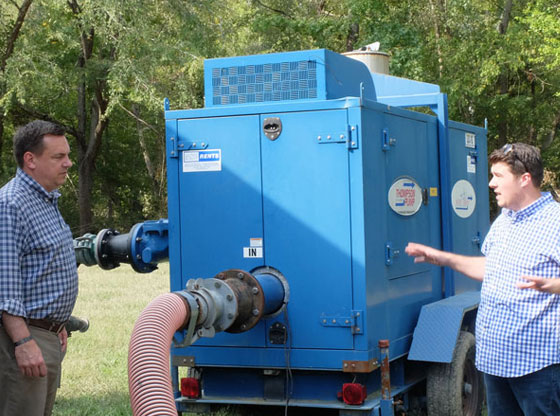
Town Manager David Lambert showing Congressman Hudson temporary equipment providing water service to Robbins in September.
The Main Pumping station requires constant attention and staff spend a significant amount of time checking the system, filling the device with fuel, and preventing sewer spills.
“Every time we have precipitation of any kind—rain or snow—we are at risk of overflowing at our main pump station” said Jeremy Monroe, Robbins’ new Interim Public Services Director.
Staff have worked hard to get waste water treatment operations back in full operation, but little more can be done until repairs are able to begin.
The Town is also seeking ways to properly dispose of its vegetative debris collected (and still to be collected) during the storm. The Town must obtain new permits for temporary and permanent locations. This could impact yard debris pick-up schedules during the beginning of 2019.
While it is likely that FEMA will—eventually—cover many of the costs associated with Hurricane Florence, the Town is not without significant financial liability.
The Town will need to front much of the costs and wait for reimbursement. While the Town currently has approximately $483,426 in its Enterprise Fund Balance, it will not be enough to cover repairs of this magnitude. The Local Government Commission requires governments to have a “savings account,” but this savings account is based on a percentage of the overall budget.
“Robbins is a very small system, and, therefore, has a small budget. A repair to a major piece of equipment will cost the same as it would in any other system only it will represent a much larger percentage of our budget,” said Lambert. The cost of the repairs to be done in Robbins exceed 300% of the Town’s annual enterprise budget.
The Town is dedicated to fixing the system and providing quality services to its residents.
“The Board of Commissioners and I are dedicated to doing everything they can to see our community through this turbulent time. There was a lot of damage to our community, but we will move forward,” said Mayor Lonnie English.
Feature photo: Robbins Town Manager David Lambert briefed officials in September on the effects of Florence on the town’s infrastructure. L,R: N.C. Rep. Jamie Boles, U.S. Rep. Richard Hudson, Robbin’s Mayor Lonnie English, County Commissioner Otis Ritter, and Town Manager David Lambert.
All Photos by Sandhills Sentinel reporter, Chris Prentice.


